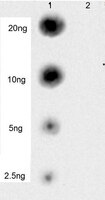Generation and characterization of anti-Adeno-associated virus serotype 8 (AAV8) and anti-AAV9 monoclonal antibodies.
Tseng, YS; Vliet, KV; Rao, L; McKenna, R; Byrne, BJ; Asokan, A; Agbandje-McKenna, M
J Virol Methods
236
105-110
2016
显示摘要
Adeno-associated viruses (AAVs) are promising viral vectors for therapeutic gene delivery, and the approval of an AAV1 vector for the treatment of lipoprotein lipase deficiency has heralded a new and exciting era for this system. However, preclinical and clinical studies show that neutralization from pre-existing antibodies is detrimental for medical application and this hurdle must be overcome before full clinical realization can be achieved. Thus the binding sites for capsid antibodies must be identified and eliminated through capsid engineering. Towards this goal and to recapitulate patient polyclonal responses, a panel of six new mouse monoclonal antibodies (MAbs) has been generated against AAV8 and AAV9 capsids, two vectors being developed for therapeutic application. Native (capsid) dot blot assays confirmed the specificity of these antibodies for their parental serotypes, with the exception of one MAb, HL2372, selected to cross-react against both capsids. Furthermore, in vitro assays showed that these MAbs are capable of neutralizing virus infection. These MAbs will be utilized for structural mapping of antigenic footprints on their respective capsids to inform development of the next generation of rAAV vectors capable of evading antibody neutralization while retaining parental tropism. | 27424005
 |








